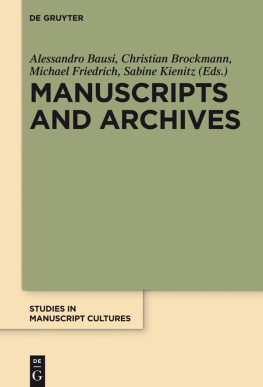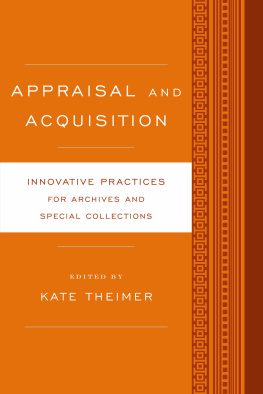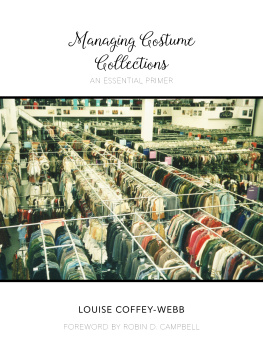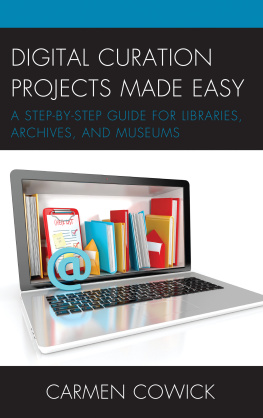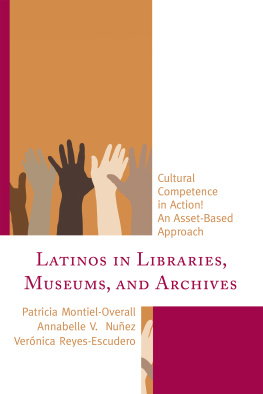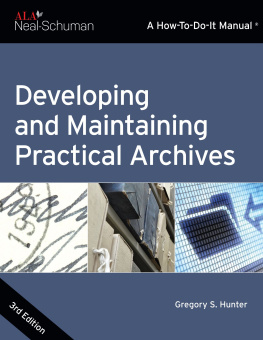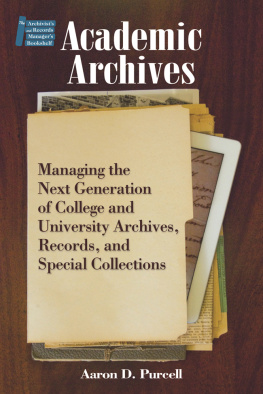
Photo by Adam Henry.
Lois Hamill is head of the Special Collections and University Archives department and a professor at Northern Kentucky Universitys Steely Library. A practicing archivist for more than twenty years, she holds masters degrees in history/archival methods and library and information science; and is both a certified archivist and a digital archives specialist. She has been professionally active in New England and the Midwest, holding board positions and serving on committees. Ms. Hamill presented at the first Global Conference on Digital Memories in Salzburg, Austria; has spoken at national and regional conferences on diverse history, archival, and library topics; and is a successful grant writer. She is the award-winning author of two books: Archives for the Lay Person: A Guide to Managing Cultural Collections and Archival Arrangement and Description: Analog to Digital.
As historians and people who value the past, we work to preserve the records in our custody. Not everyone who protects and manages historical records is professionally trained for this work. Although well intentioned, they can unknowingly cause damage for lack of appropriate training. I hope that this volume will help those who read it to at least cause no irreversible damage. I am hopeful, however, that they will go beyond that and do good.
I would like to thank Jim OToole, who taught me the questions to ask, and Don Corey of the Bedford (Massachusetts) Historical Society for the many pleasant hours I spent working there. Special thanks go to Lisa Perna, Patrick Diesman, and Kiki for their support and encouragement. Thanks to my colleague John Schlipp for updates on copyright and intellectual property and my supervisor Lois Schultz for release time.
Thank you, Rick Hilton and Brian Gomez of PastPerfect Software, Inc., for allowing me to test the latest version of their software and for the honor of being the first person outside the company to have a copy of the newest user guide.
Thanks to my editor Charles Harmon for the opportunity to work with him again.
Special Collections and University Archives
Northern Kentucky University
The Northern Kentucky Universitys Special Collections and University Archives has a responsibility to maintain all material entrusted to its care in good condition. Researchers are asked to exercise the greatest care in handling documents and books and not mark them in any way. The Archives reserves the right to limit the use of restricted records as well as collections that are unprocessed or fragile. The following policies are intended to help preserve the universitys collections.
1. Researchers are required to register on their first visit to the University Archives. Please sign in on each subsequent visit. Registration forms will become a permanent record of the department.
Explanation: This is for security reasons, to document the identity of researchers and specific days when they used records.
2. Collections are available to the public for the purpose of research. Persons under the age of sixteen, however, will not be permitted to use materials unless they are accompanied by adults who will take responsibility for the safe use of the materials.
Explanation: Children may be unaware of the potential for permanent damage through careless handling.
3. All packages, bags, and briefcases must be stored in the lockers outside of the Archives Reading Room. The staff reserves the right to inspect all notebooks, laptops, and personal belongings prior to a researchers departure from the Archives Reading Room.
Explanation: This is for security and preservation reasons. It minimizes opportunities to steal material. It also removes potentially wet coats and bundles that crowd the workspace, might be put on top of archival materials, or otherwise cause physical damage to records.
4. No food or beverages are allowed in the Archives Reading Room.
Explanation: They can attract bugs that would eat the records. Sticky substances can cause records to stick against one another and tear. Grease can transfer to the records themselves, thus damaging them. These are all preservation concerns.
5. In order not to disturb others, please silence all cell phones. Step outside the Reading Room to make telephone calls.
Explanation: This is a courtesy to other researchers and department personnel.
6. All material must be used in the Archives Reading Room.
Explanation: If records leave the Reading Room, they may be handled improperly, causing physical damage, a preservation concern. If records leave, they may not return. Most are irreplaceable, causing a permanent loss of information/history. This is a security concern.
7. Researchers must use pencil or laptop computer for note taking. Pens, markers, and scanners may not be used in the Archives Reading Room.
Explanation : This is for preservation purposes. Pens and markers are not reversible and cause permanent damage. Many researchers do not know how to use scanners without causing physical damage, or when something cant physically undergo scanning. Almost none are knowledgeable enough to apply copyright or other restrictions. This is a legal concern.
8. Care must be taken in handling all Special Collections and University Archives material. All items must lie flat on the tables. Nothing is to be placed on top of the material, excepting book snakes.
Explanation: This is for preservation purposes. Some items are brittle and break easily. Bundles and other materials are placed in lockers to prevent accidental but possibly permanent damage.
9. The original order of all collections must be maintained. Do not rearrange material. Please report any disarrangement to the staff.
Explanation: During arrangement records are either left according to their original order, or intentionally put in a particular sequence. Most non-archivists are unaware of this and are unable to perform this work. Misfiling makes it difficult for others to locate information using these files and can create extra work for the staff.
10. Limited photocopy services are available. Refer to the fee schedule for pricing. The Archives reserves the right to limit the number of copies made and to refuse to copy any item if such copying will damage the material. Copies of entire books, manuscript collections, or archival record groups will not be made. We reserve the right to refuse to copy material that in our judgment would violate copyright law.
Explanation: This addresses concerns for the preservation of the records and copyright/legal issues.
11. Researchers who wish to publish, reprint, or reproduce materials in the collection must request permission in writing from the university archivist.
Explanation: This would also be a copyright concern.
| ____________________________________________________ | _________________________ |
| Name | Date |
Special Collections and University Archives
Northern Kentucky University
A. Clean Hands
1. Do not eat or drink while handling photographic materials (prints, negatives, slides, etc.).
2. Wash your hands before working with collections.
B. Plan
1. Make sure you have sufficient work space to accommodate the items with which you intend to work.
2. Make sure you have the tools you need for the job (pencils, paper, housing material).
3. Before moving items, especially oversize, check their condition. If damaged, seek advice before proceeding and use care.


